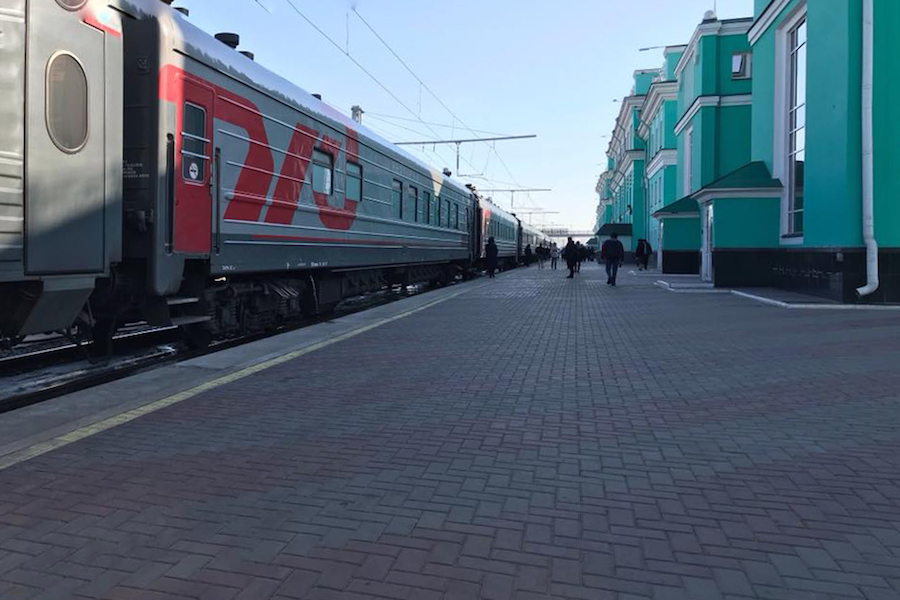
Riding the Trans-Siberian Railway
 On a dark Sunday night, with hints of moisture floating down on indifferent passersby, I stood in front of a trio of train stations in Moscow, mentally preparing to ride the Trans-Siberian railway. The streets were gloomy — it’s a noticeable attribute that doesn’t steal from the city’s splendor and prestigious might.
On a dark Sunday night, with hints of moisture floating down on indifferent passersby, I stood in front of a trio of train stations in Moscow, mentally preparing to ride the Trans-Siberian railway. The streets were gloomy — it’s a noticeable attribute that doesn’t steal from the city’s splendor and prestigious might.
In Moscow, towering cathedrals intermingle with stoic Soviet-style apartment blocks and government buildings. The stark red walls of the Kremlin lie within a stone’s throw of modern retailers and the bridge where an opposition politician was murdered. Moscow is at once terrifying and captivating, and my short visit to the capital was a fitting prelude for a trip to Siberia to round out spring break.
I stood at the confluence of Leningradsky, Kazansky and Yaroslavsky stations, mentally preparing for a journey covering thousands of miles. I would be disembarking in Irkutsk — a city in Eastern Siberia — four days later, before flying back to St. Petersburg a few days later. There were no overnight stoppages, or showers, on the way. For the next half-week I would be consigned to a metal tube on wheels, which was incredibly exciting.
I entered Yaroslavsky station, into a well-lit hall that countered the shadowy streets outside. There was the normal hodgepodge of passengers with backpacks, beat-up suitcases, grocery bags overflowing with instant noodles and salami and the odd wooden post that induced mild irritation when it was time to pass through the X-ray machines. We walked through metal detectors that invariably beeped and whistled, but the police officers paid no mind.
After an hour of waiting, a combination of sitting on the floor and thumb-twiddling, the platform number flashed on the video board. I gathered my backpacks — one for books and one for clothes — and boarded the silver-colored train, the final step to a journey that had sparked my enthusiasm for Russia in the first place. Have you ever dreamed of something so far away it never seems possible? This was my impossible dream, now emerging in reality.
I had booked a second-class compartment, known as a kupe in Russian, and it was on the whole a rather nice setup. There were four sleeping berths. The lower berths could transform into plush blue seats. The upper berths, where I was, had enough cushion to make sleeping a relatively easy affair. There was a TV hooked to the wall above the door, personal channel controls, a large window, a table, an outlet that didn’t always work and nicely pressed sheets and blankets that were included with the ticket.
The kupe was located in the second-class train car, with other compartments spanning its entire length. Outside the compartments was a narrow, carpet-lined corridor, just wide enough to fit a person and a half. There was a handrail and windows for our viewing pleasure. The bathrooms were set at the end of the car. Despite the horrifying cliches about train toilets, I experienced no real issues besides almost falling in one time.
Life on the train resembled a neighborhood, with dozens of people living and passing the time in their own little “homes” next to one another. I was one of the few passengers taking the train mainly for the journey itself and not so much for the destination. The train was usually only a means to an end. This was made clear by my first “roommates,” an older woman and her young son returning to Yekaterinburg after a holiday in Moscow. They weren’t especially talkative, even with each other, and I gathered enough to sense they were focused more on life outside the train than within.
They disembarked in the middle of the night, part of a rather large passenger turnover at every major station. In Omsk — the city where Dostoyevsky was exiled for allegedly circulating socialist literature — I was joined by another family, this time a husband, a wife and their 4-year-old son. The man introduced himself with a firm handshake, and following a tradition I’ve found remarkably persistent in Russia, proceeded to step outside for a quick smoke before the train departed. His wife, a pleasant woman named Dasha, spent most of her time wrangling with the 4-year-old, which proved rather amusing.
I chatted a bit with Dasha and discovered they were going to Khabarovsk, a city in the Russian Far East, to see their relatives. She waxed poetic about the blood-freezing temperatures of Omsk, her hometown, and laughed when I expressed how uncomfortable I was after transplanting myself from the Arizona desert to St. Petersburg at the start of the year. (This conversation just confirmed what I learned soon after landing in Russia for the first time — people here talk about the weather as much as anything else.) Invariably, her son would chime in, wanting to play games on her phone or demanding to receive a car for his birthday. Children have the same designs everywhere, it seems.
If my compartment was the place for sleeping and small talk, the dining car was the place for just about everything else. Upon entering it, a quick hop from my own car, I was struck by the colors. The curtains and tablecloths were a deep maroon, and the flowers placed on every table bloomed every shade imaginable, from orange-yellow to a stoic dark green. For the next half-week, I came to appreciate this vibrancy as the perfect setting for drinking coffee (and some vodka, of course) and looking out the window — all while strange Michael Jackson covers played in the background.
The Trans-Siberian railway, at least from Moscow to Irkutsk in early April, is not particularly scenic. Much of what I saw was… nothing. Birch trees and shrubbery poke through the snow against the background of vast nothingness. Beyond these enclaves of snow and forest is more snow and forest, playing the role of lead actor against a stage filled by the deep horizon and overhanging sky. Pockets of evergreens did grow more prominent as the train inched closer to Irkutsk, providing a nice splash of natural beauty even as the bare hills and relative sparsity remained constant throughout.
While great photo shoots were lacking, the opportunities for reflection weren’t. The best journeys don’t need to be scenic to be worth remembering. Social media has taught us to seek the perfect and the fame-worthy. Instant gratification is its corollary. The benefits of patience, and of boredom, aren’t always appreciated. Travelling the Trans-Siberian railway is a surefire cure, because there’s only so much reading, talking, drinking and sleeping you can do before feeling the urge to find a window and relax your mind. I spent countless hours watching the Siberian landscape pass by. It was nature — unspoiled, raw and sometimes ugly. But Siberia doesn’t need a perfectly sculpted landscape to instill an otherworldly awe. The emptiness is power enough.
Time passes more slowly on a train, and the days bleed together. After crossing the Ural Mountains — the official divide between Europe and Asia — sometime during the second night, the signs of civilization dropped precipitously. Still, we passed through working areas. There were men in parkas and orange vests fixing railroad ties and people driving truckloads of supplies through isolated, muddy streets, indifferent to us because they see trains every single day. We passed near Kemerovo, the city where dozens of people died in a shopping mall fire that made international headlines. The train carried us near the border of Kazakhstan and then Mongolia. We crossed the longitudinal centers of Afghanistan and Pakistan, of India and a fair bit of Southeast Asia.
We traveled through a land of records — Russia is the largest country in the world, enveloping almost 11 percent of the world’s land mass. It holds the world’s deepest and oldest lake. We saw terrain renowned for its frostbitten winters. The train covered a distance of over 3,000 miles in four nights, a few hundred miles greater than the entire width of the United States. Irkutsk, where I disembarked, is still 2,000 miles from the route’s terminus in Vladivostok, a Pacific port. Flying back to St. Petersburg takes almost the same amount of in-air time as a transatlantic flight from Chicago to London. It’s easy to read about Russia’s size, but I only fully grasped the weight of that claim after four nights on a well-oiled train and a flight back. Russian distances belong on a cosmological scale.
There’s nothing quite like cross-country train travel. Planes favor expediency over intimacy; cars value freedom to the extreme. In a train, boundaries between the people and the country are blurred. Control is relinquished to the railroad tracks. By the time Thursday rolled around and it was time to leave, I decided I would miss the small quarters and the singular landscapes beyond. It had started to feel like home.
One of the premier books on Siberia is Ian Frazier’s “Travels in Siberia.” Frazier — a staff writer for The New Yorker — and his guide spend weeks at time in a rickety van, traveling back roads and highways to discover the soul of Siberia and the people who live there. His willingness to sacrifice his pride for a good lesson and a better story was a guidepost to live by as I crossed the same terrain by train.
Unlike Frazier, I’m not a professional writer for a magazine traveling with the help of a $20,000 advance. But like him, my quest was to understand Russia percolated with the reputation of Siberia, known to most outsiders only as a permanently frigid place with a bloody history of exile and misfortune. It was never a question of if, but rather when, I would see this infamous region for myself.
There’s a saying in Russia: It’s better to see once than to hear a hundred times. I’ve seen only a tiny sliver of Siberia — through the train windows, within the frontier-like city of Irkutsk once I left the train, and across to its fabled neighbor, Lake Baikal. Such sights don’t come easily, and discomfort is a required part of the journey — lack of showering included. But it’s better to see it once, as the Russians say. Siberia deserves that at the very least.
Written by: Nick Irvin — ntirvin@ucdavis.edu
Disclaimer: The views and opinions expressed by individual columnists belong to the columnists alone and do not necessarily indicate the views and opinions held by The California Aggie.





